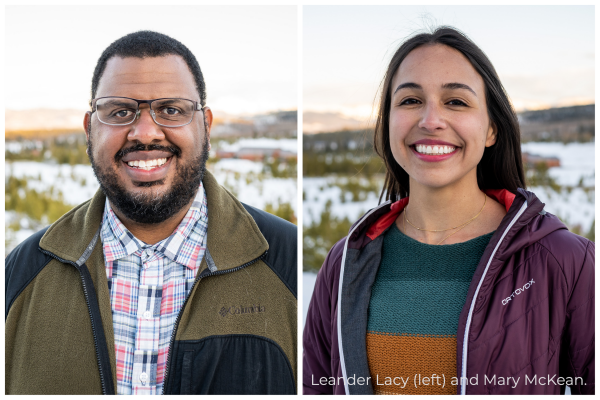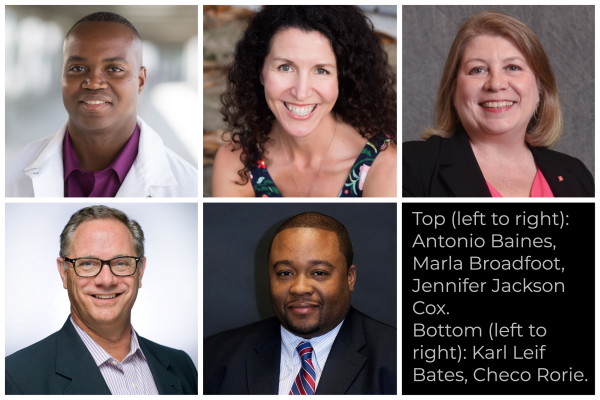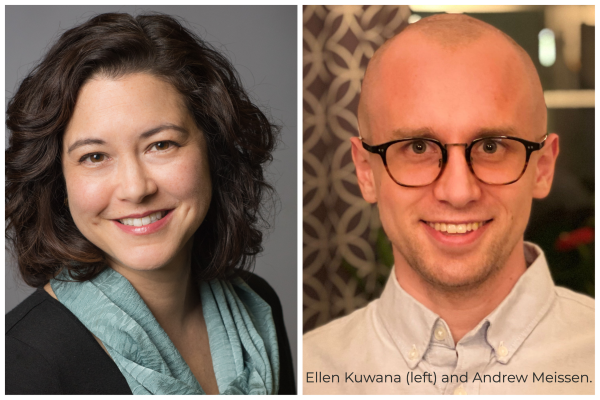Three projects aiming to empower science writers and communicators to more effectively reach diverse audiences and to express and manage pandemic-related mental health issues have been selected by NASW’s Grants Committee to receive Peggy Girshman Idea Grants. The $15,000 awarded in the latest funding round adds to more than half a million dollars granted since the program’s inception in 2010.
Each year, the Grants Committee reviews applications and selects proposals that support science writers, editors and communicators through novel projects that are consciously broad and challenge the status quo. After reviewing 11 proposals, the committee granted awards to the following three groups, using funds from NASW’s Authors Coalition of America distributions:
 Planning specialist and science communicator Mary McKean with co-applicant Leander Lacy, a social scientist and consultant, will receive $9,380 for their project, “JEDI in Conservation Writing Standards.”
Planning specialist and science communicator Mary McKean with co-applicant Leander Lacy, a social scientist and consultant, will receive $9,380 for their project, “JEDI in Conservation Writing Standards.”
Building upon the framework of JEDI (Justice, Equity, Diversity, and Inclusion), McKean, a planning specialist for the National Parks Service and science communicator, and Lacy, a consultant with expertise in researching JEDI practices, will produce a whitepaper and accompanying webinar that provides science writers and communicators with evidence-based guidelines on how to effectively and authentically communicate science to reach more diverse audiences. Specifically, they will (1) Identify gaps in the current science writing field and identify initial strategies and solutions; and (2) Distill findings into key takeaways available to the public.
Their project will incorporate social science research through interviews with Black, Indigenous, and other People of Color (BIPOC) individuals to discuss gaps in science communication from their perspective, a targeted literature review, and data-backed recommendations.
Funds will directly support the BIPOC individuals who donate their time for interviews, publication/editing time and effort to produce content, and professional video/photo support for the webinar. Final guidelines outlined in the whitepaper and the recorded webinar are expected to be made available to the public on NASW.org.
“Our goal is to directly benefit underrepresented individuals by enabling more inclusive, relevant content to reach them in their communities—and ultimately diversify the field by increasing engagement and trust in science,” McKean and Lacy wrote. “We are committed to working with NASW to advance our shared goal of supporting and advocating for science writers, and ensuring our recommendations work in practice. Though our current scope is conservation and climate science, our tools will be made relevant for all science communicators.”
 Members of Science Communicators of North Carolina (SCONC) will receive $3,000 to develop “Science Communication Internships for HBCU Students.”
Members of Science Communicators of North Carolina (SCONC) will receive $3,000 to develop “Science Communication Internships for HBCU Students.”
The proposal will support one paid 10-week internship program to place a STEM student from a Historically Black College and University (HBCU) into a science communication internship with either a research university, science museum, federal lab or private sector science entity in the Piedmont region of North Carolina.
The funds will also indirectly support the beginning stages of a new pilot program, which is modeled on a 14-year partnership between North Carolina Central University (NCCU) and Duke University that has placed 170 communications majors from NCCU in Duke’s communications offices for paid, 10-week summer internships.
Through this new program, the team will recruit and orient the prospective intern from science-writing classes at two North Carolina HBCUs (NCCU and North Carolina Agricultural and Technical State University) and provide them with real-world exposure to jobs in science communication.
Several members of SCONC will lead this project: Karl Leif Bates, who is a founding member of SCONC and Executive Director of Research Communications at Duke University; Marla Broadfoot, a freelance science writer and editor; Jennifer Jackson Cox, a freelance science writer and editor; Checo Rorie, interim chair of Biology at NC A&T University who teaches Writing in Biology; and Antonio Baines, associate professor of biology and biomedical sciences at NCCU who teaches Undergraduate Scientific Writing.
“Diversity, bias and inclusiveness are problems every field has been re-examining and talking about with renewed passion in the past year. But most of it has been just that—talk. This is one small step the science writing community could take toward having a more healthy mix of science communicators,” the team wrote in their application.
Although the program is a local effort, the team hopes that the internship model they develop could be replicated or modified to be implemented regionally and nationally.
 Science writers-editors Andrew Meissen and Ellen Kuwana will receive $2,620 for their project, “Pandemic Recovery: Mental Health Aspects of COVID-19 (Resilience, Reframing, and Reconciliation).”
Science writers-editors Andrew Meissen and Ellen Kuwana will receive $2,620 for their project, “Pandemic Recovery: Mental Health Aspects of COVID-19 (Resilience, Reframing, and Reconciliation).”
Meissen and Kuwana will lead an interactive webinar/online workshop that explores the unique ways the science writing community has been affected by the pandemic—from the exhaustion experienced through covering the pandemic on the frontlines, to enduring personal tragedies related to the pandemic.
The workshop will feature an expert in the healthcare profession who is also familiar with science, journalism and writing. Through the interactive workshop, Meissen and Kuwana will facilitate activities and discussion centered around mental health and recovery. They aim to “provide validity to everyone’s pandemic traumas and mental health challenges.” The workshop will also equip attendees with practical advice on how to process their emotions from the past year.
“No matter their experience, we want to provide a forum and create a community where people feel safe to share their sadness and other emotions related to the pandemic, as well as a place where people can learn from others, including experts,” Meissen and Kuwana wrote. “Participants should expect to leave feeling better, feeling heard, and more ready to face the uncertain world.”
NASW’s Idea Grant program is named in honor of the late Peggy Girshman, who passed away in 2016. Girshman, a founding member of the Grants Committee, was a longtime mentor and advocate for science writers. Her distinguished career included positions at several media organizations, including NPR, several broadcast organizations, and Kaiser Health News, which she helped co-found.
Since 2010, NASW has funded projects totaling more than $545,000 to benefit science writers and communicators. Applications for grants, which generally range from $1,000 to $15,000, typically open in October of each year. In response to need in the field generated by the tumultuous events of 2020, this additional round was offered in early 2021. For more information visit, nasw.org/awards/ideagrants.
Hero image by jplenio on Pixabay.

